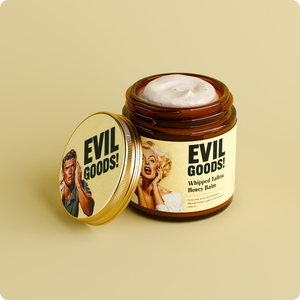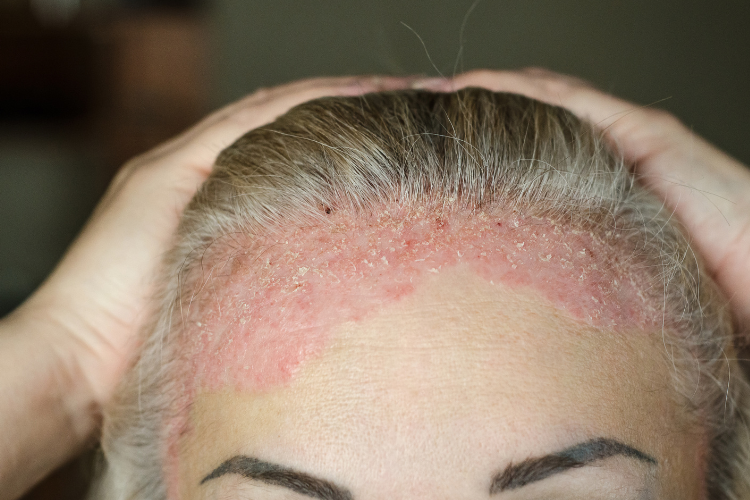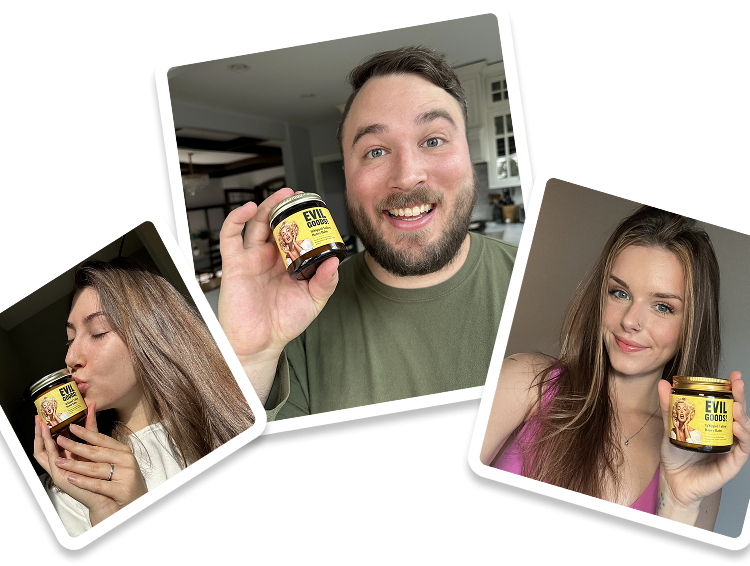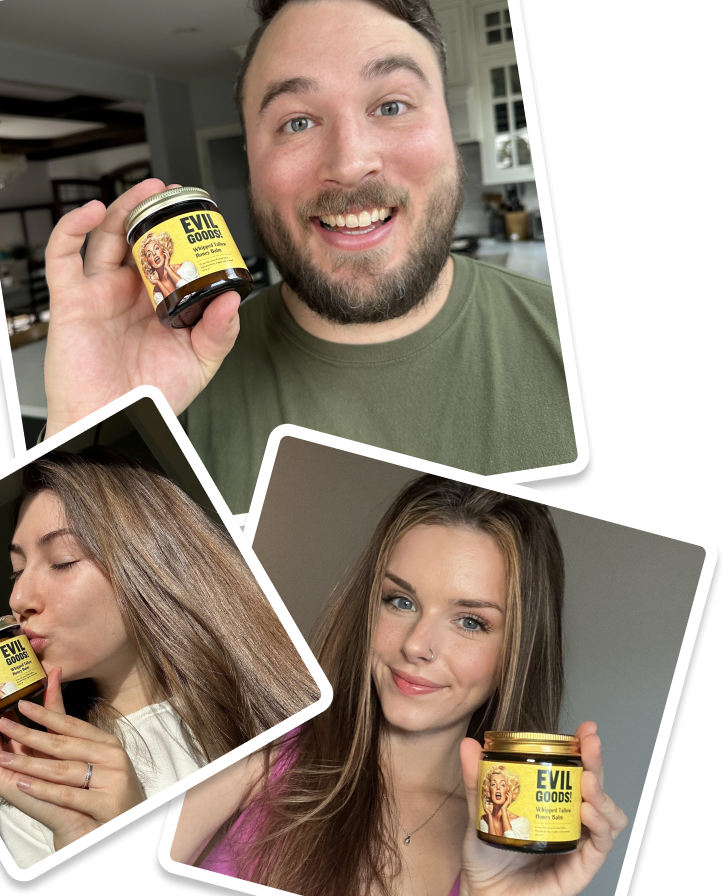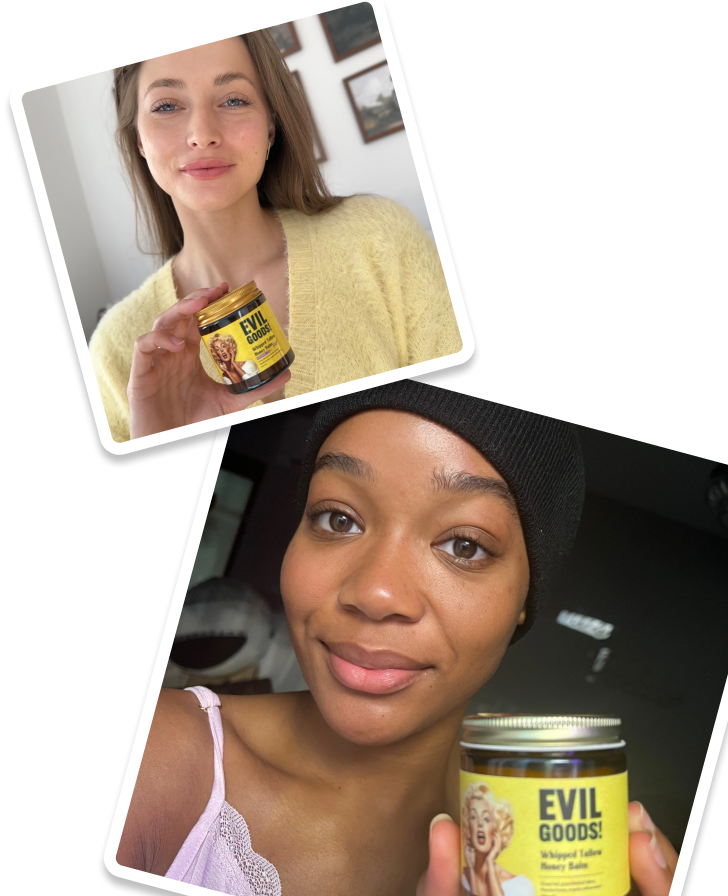Evil Goods!Living with eczema, also known as atopic dermatitis, can be frustrating. The constant itchy skin, dry patches, and scaly appearance often leave behind irritated skin that affects sleep, mood, and confidence. Frequent eczema flares make things worse. For people with eczema who also struggle with food allergies or seborrheic dermatitis, the risk of skin infections and flare-ups is even higher.
Doctors sometimes recommend prescriptions like steroid creams, oral medications, or other topical treatments to help with severe eczema. However, many look for gentler approaches.
In this article, we’ll explore safe natural remedies for eczema. We'll also share how Evil Goods’ clean, skin-soothing products can strengthen your skin barrier and prevent flares while letting your skin breathe naturally.
What Exactly is Eczema?
Eczema, or atopic eczema, is a chronic skin condition that inflames your skin, leaving it itchy and super sensitive. The most common symptoms are itchy patches, inflammation, and very dry skin that just won’t seem to stay hydrated.
Eczema affects people of all ages, skin tones, and backgrounds. Babies can have it, kids can have it, adults can have it, too. And here’s something a lot of people worry about but don’t need to: eczema is not a contagious condition. You can’t pass it on to someone else.
What makes it confusing is its appearance. Some people have mild redness and dryness, while others with severe eczema may have skin that cracks, leaks pus, and is prone to skin infections. And because eczema often flares and calms in cycles, it can trick you into thinking it’s gone until it returns.
Why Eczema Happens
So, why does eczema show up in the first place?
Eczema occurs when your skin barrier function isn’t doing its job. A healthy skin barrier keeps moisture locked in and irritants out. But if that barrier weakens, moisture escapes, and irritants slip in. When that happens, your immune system goes into overdrive, reacting to things that wouldn’t normally cause an issue.
This is why eczema symptoms, like itchy skin, dry skin, and redness, flare so easily. Add scratching to the mix, and the skin breaks down more, opening the door for skin infections.
There are also other risk factors that raise your chances of getting eczema:
-
A family history of hay fever, asthma, or atopic dermatitis
-
Food allergies
-
Dust mites, pollen, or pet dander
-
Stress, which makes the skin itchier
-
Harsh soaps and detergents
-
Certain foods that don’t sit well with your body
Read our guide on how to get your best skin here.
The Different Types of Eczema

Most people think eczema is just one thing, but there are actually seven types of eczema:
-
Atopic Dermatitis: This is the most common type.
-
Contact Dermatitis: It’s triggered by allergens or irritants (think perfume or cleaning products).
-
Seborrheic Dermatitis: This one usually shows up on the scalp or face.
-
Dyshidrotic Eczema: This type causes itchy blisters on the hands and feet.
-
Nummular Eczema: It forms round, coin-shaped spots on the skin.
-
Neurodermatitis: It comes as a result of chronic scratching.
-
Stasis Dermatitis: This is tied to poor circulation in the legs.
This is why it’s so important to have a primary care provider or dermatologist diagnose eczema correctly. They’ll look at your skin, your history, maybe run allergy tests, and help figure out if what you’re experiencing is actually eczema or another condition like psoriasis.
Natural Remedies That Actually Alleviate Eczema
Here are the best natural remedies and home remedies that people swear by, as well as those supported by science, for eczema relief.
Beef Tallow
It might sound surprising, but grass-fed beef tallow is amazing for very dry skin. Why? Because it’s packed with fatty acids that mimic the oils your body naturally makes. It:
-
Moisturizes without leaving a greasy film, so your skin can breathe.
-
Supports the skin barrier.
-
Calms irritated skin and helps with eczema flare-ups.
When combined with ingredients like manuka honey, olive oil, and calendula, it becomes a powerful balm for individuals with eczema.
Read about the many benefits of beef tallow here.
Colloidal Oatmeal
Recognized by the National Eczema Association, colloidal oatmeal is one of the most trusted solutions. It:
-
Soothes itchy skin and inflamed skin.
-
Softens rough patches of scaly skin.
-
Creates a protective coating to prevent eczema flares.
-
Works in a warm bath or is applied directly to the skin.
Coconut Oil & Sunflower Seed Oil
These two natural oils are some of the most researched alternative therapies for eczema.
-
Coconut oil has antibacterial properties, reducing the risk of skin infections.
-
Sunflower seed oil improves skin barrier function and helps reduce itchiness.
-
Both hydrate dry skin and smooth scaly skin.
Aloe Vera
Light, cooling, and soothing, aloe vera is a go-to for calming irritated skin. It:
-
Rehydrates dry skin.
-
Reduces redness and inflamed skin.
-
Layers well under topical treatments.
Apple Cider Vinegar
People often try apple cider vinegar as a home remedy. It can be helpful, but you need to be cautious. It:
-
May balance skin pH.
-
Has light antibacterial properties.
-
Must be diluted or it can sting and cause an allergic reaction.
-
Always check with a healthcare provider first.
Tea Tree Oil
Tea tree oil is a powerful but potentially risky substance. It:
-
Offers antibacterial properties that can help with eczema symptoms.
-
May calm itchy skin.
-
Needs patch testing, since it can make contact dermatitis or sensitive skin worse.
Calendula & Chamomile
People have been using gentle herbs for centuries:
-
Calendula supports the healing of scaly skin and strengthens the skin barrier.
-
Chamomile calms eczema symptoms and supports mental health with its soothing scent.
Bath Treatments for Eczema
Bathing can either make eczema worse or provide huge relief if you do it right.
-
Take a warm bath (not hot) for 10–15 minutes.
-
Add colloidal oatmeal or a splash of coconut oil for extra comfort.
-
For stubborn cases, a doctor-guided bleach bath may help lower the risk of skin infections.
-
Always apply moisturizer within three minutes after bathing (the 3-minute rule).
Skip harsh soaps and hot water because they will strip your skin barrier and make the skin itchier.
Lifestyle Habits That Help Manage Eczema

Your lifestyle can also help in managing eczema. Here are some things that can help:
-
Avoid Common Triggers: Steer clear of harsh soaps, irritating fabrics like wool, and certain foods if you have food allergies.
-
Reduce Stress: Stress makes eczema flares worse. Deep breathing, yoga, or just taking time for yourself can keep your mental health steady and your skin calmer.
-
Stay Consistent: Daily moisturizing, avoiding irritants, and using topical treatments as directed keep the skin barrier function stronger.
Food and Probiotics: Healing From the Inside
Your diet matters more than you might think:
-
Probiotics may help balance your gut, which can improve eczema symptoms.
-
Foods rich in omega-3 fatty acids, vitamin D, and antioxidants can strengthen the skin barrier.
-
Identifying and removing certain foods that trigger food allergies may help prevent eczema flares.
A primary care provider can guide you through elimination diets and allergy testing to figure out what works best for your body.
Medical Support for Eczema
Even if you lean on natural remedies, sometimes you need extra help.
-
Topical treatments, such as steroid creams or petroleum jelly, can help calm flare-ups quickly.
-
Doctors may prescribe stronger topical medications or prescription treatments for severe eczema.
-
Light therapy can be an option if creams aren’t enough.
The best approach often combines natural and medical care.
Caring for Children with Eczema

Eczema often affects children, and their sensitive skin requires extra care.
-
Use fragrance-free moisturizers daily.
-
Add colloidal oatmeal to bathwater for relief.
-
Dress them in soft, breathable fabrics.
-
Trim nails to prevent scratching and tearing your skin.
-
Watch for triggers like dust mites or certain foods.
Work closely with your healthcare provider to build a plan that fits your child’s needs.
How Evil Goods Natural Skin Products Soothe Eczema Naturally
Evil Goods products are the best natural solutions for eczema if you have sensitive skin or flare-ups that happen often. Our products help heal the skin barrier, soothe dry and itchy skin, and support eczema relief without using harsh chemicals. They do this through nutrient-rich, gentle ingredients.
Shop our beef tallow's skin products for clear, moisturized skin today!
Use our Whipped Beef Tallow & Manuka Honey Balm to:
-
Strengthens and Nourishes Your Skin: Natural fatty acids and vitamins D, E, and A in grass-fed tallow help retain moisture and strengthen the skin barrier. This makes it great for people with very dry skin, irritated skin, and atopic eczema.
-
Soothes and Heals: With manuka honey, organic olive oil, chamomile, and vitamin E, this balm gently heals and soothes skin that is red and itchy from eczema.
-
Made for Sensitive Skin: Clean and safe for people who have eczema, acne, and sensitive skin, no scents, essential oils, parabens, or toxins.
We make our natural skin care products at Evil Goods with one goal in mind: to help protect and nourish your skin without harsh ingredients, especially if you have acne and your skin feels fragile.
Frequently Asked Questions
What Is Eczema?
Eczema is a long-term inflammatory skin condition that causes dry, itchy skin and rashes. Atopic dermatitis, the most prevalent type, is generally caused by a person's genes and an immune system that overreacts.
What Does Eczema Look Like?
Eczema typically appears as dry, red, and irritated skin that’s extremely itchy. The scaly skin can sometimes fracture and leak pus, which can lead to secondary skin diseases.
How Can I Treat Eczema Without Drugs?
People often use safe, natural remedies, including Evil Good's Whipped Beef Tallow Honey Cream, to calm sensitive skin, repair the skin barrier, and support skin barrier function. You can also prevent flares with coconut oil, sunflower seed oil, colloidal oatmeal, aloe vera, apple cider vinegar, and tea tree oil.
What Does the 3-Minute Rule Mean for Eczema?
The 3-minute rule says that you should put on moisturizer within three minutes of taking a warm bath or shower to keep your skin from getting too dry. This is particularly important for people with eczema, as it helps strengthen the skin barrier and reduces skin irritation.
What Does Your Body Need When You Have Eczema?
A shortage of one vitamin doesn't cause eczema, but it’s commonly linked to a skin barrier that isn't working properly. When this barrier isn't strong enough, the skin loses moisture and is more likely to be bothered by irritants and allergens. We recommend our natural face moisturizers for relief.
What Causes Eczema to Get Worse?
Several factors can trigger eczema flare-ups, including harsh soaps or detergents, allergens such as dust mites or pollen, and certain foods. For a lot of people with eczema, stress, sweat, and changes in temperature can make their symptoms worse.
What Is the Main Thing That Causes Eczema?
Genetic and environmental factors may contribute to the development of eczema. It isn't an autoimmune illness, but it’s connected to an overactive immune system and a weak skin barrier, which makes the skin more sensitive to irritants and allergens.
What Can You Do to Make Eczema Go Away?
There is no one-size-fits-all remedy for eczema, but you may manage it well by sticking to a regular routine and staying away from things that make it worse. This means using moisturizers daily, taking a warm bath, and consulting a doctor about prescription treatments or guidance on specific triggers, such as food allergies.
Last Thoughts on Eczema and Skin Products
Eczema is a tough skin condition, but it can be managed. With the right mix of natural solutions for eczema, lifestyle adjustments, and guidance from your primary care provider, you can calm eczema symptoms, strengthen your skin barrier, and reduce the number of eczema flare-ups.
There are plenty of options for safe home remedies, including coconut oil, colloidal oatmeal, aloe vera, apple cider vinegar, and tea tree oil. Add in diet changes, stress management, and smart topical treatments, and you’ll be on your way to healthier, calmer skin.

Dr. Elena Dinkollari
MD, Dermatologist & Endocrinology Assistant
Doctor Approved
